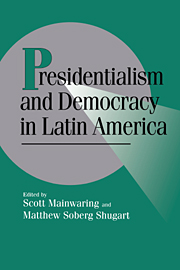Book contents
- Frontmatter
- Contents
- Contributors
- Acknowledgments
- Introduction
- 1 Presidentialism and Democracy in Latin America: Rethinking the Terms of the Debate
- 2 Multipartism, Robust Federalism, and Presidentialism in Brazil
- 3 The Unrealized Potential of Presidential Dominance in Colombia
- 4 Presidential Behavior in a System with Strong Parties: Venezuela, 1958–1995
- 5 Strong Candidates for a Limited Office: Presidentialism and Political Parties in Costa Rica
- 6 Political Sources of Presidencialismo in Mexico
- 7 Evaluating Argentina's Presidential Democracy: 1983–1995
- 8 In Defense of Presidentialism: The Case of Chile, 1932–1970
- 9 Executive–Legislative Relations in Post–Pinochet Chile: A Preliminary Assessment
- 10 Hybrid Presidentialism and Democratization: The Case of Bolivia
- 11 Conclusion: Presidentialism and the Party System
- Appendix: Outlines of Constitutional Powers in Latin America
- References
- Index
4 - Presidential Behavior in a System with Strong Parties: Venezuela, 1958–1995
Published online by Cambridge University Press: 05 June 2012
- Frontmatter
- Contents
- Contributors
- Acknowledgments
- Introduction
- 1 Presidentialism and Democracy in Latin America: Rethinking the Terms of the Debate
- 2 Multipartism, Robust Federalism, and Presidentialism in Brazil
- 3 The Unrealized Potential of Presidential Dominance in Colombia
- 4 Presidential Behavior in a System with Strong Parties: Venezuela, 1958–1995
- 5 Strong Candidates for a Limited Office: Presidentialism and Political Parties in Costa Rica
- 6 Political Sources of Presidencialismo in Mexico
- 7 Evaluating Argentina's Presidential Democracy: 1983–1995
- 8 In Defense of Presidentialism: The Case of Chile, 1932–1970
- 9 Executive–Legislative Relations in Post–Pinochet Chile: A Preliminary Assessment
- 10 Hybrid Presidentialism and Democratization: The Case of Bolivia
- 11 Conclusion: Presidentialism and the Party System
- Appendix: Outlines of Constitutional Powers in Latin America
- References
- Index
Summary
INTRODUCTION
In Venezuela the party system has been dominated for most of the democratic era by two, highly disciplined, centrist political parties. Because parties have been so well organized and disciplined, they are important for understanding the nomination process, elections, the behavior of legislators, and even the relative success of interest groups. Scott Mainwaring's analysis of Brazil illustrates how the apparently significant, formal powers of the president can be stymied by the existence of multiple, undisciplined parties. In Venezuela, the converse is true. Presidents can overcome the relatively sparse formal powers of their office, particularly during majority governments, and interbranch immobilism is rarely a problem. Disciplined parties limit immobilism because majority presidents can almost always count on the support of their parties and because minority presidents are better able to form stable, postelection coalitions. When presidents cannot count on support in Congress, immobilism is still unlikely to result because presidents have virtually no reactive powers with which to thwart the legislature's will and clog the process. A major theme of this volume is that the interaction of constitutionally allocated powers and partisan powers is central to understanding presidentialism in Latin America. In particular, presidential strength is highly conditioned by the partisan composition of the government, which is itself the result of a number of factors including electoral regulations and timing. In Venezuela, party politics, including characteristics internal to the parties themselves and those inherent in the electoral system, affect the president's use of his or her constitutionally allocated powers in a complex and intertwining manner.
- Type
- Chapter
- Information
- Presidentialism and Democracy in Latin America , pp. 160 - 198Publisher: Cambridge University PressPrint publication year: 1997
- 9
- Cited by



